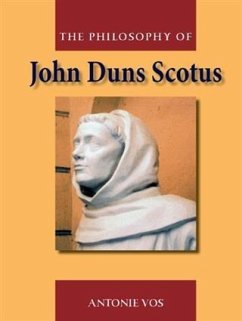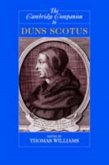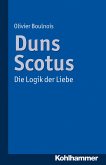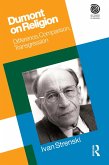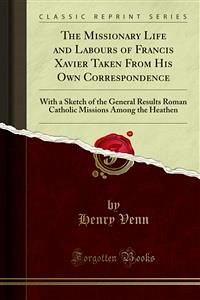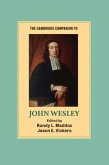Philosophy of John Duns Scotus (eBook, PDF)


Alle Infos zum eBook verschenken

Philosophy of John Duns Scotus (eBook, PDF)
- Format: PDF
- Merkliste
- Auf die Merkliste
- Bewerten Bewerten
- Teilen
- Produkt teilen
- Produkterinnerung
- Produkterinnerung

Hier können Sie sich einloggen

Bitte loggen Sie sich zunächst in Ihr Kundenkonto ein oder registrieren Sie sich bei bücher.de, um das eBook-Abo tolino select nutzen zu können.
John Duns Scotus is arguably one of the most significant philosopher theologians of the middle ages who has often been overlooked. This book serves to recover his rightful place in the history of Western philosophy revealing that he is in fact one of the great masters of our philosophical heritage. Among the fields to which Scotus has made an immense contribution are logic, metaphysics, philosophy of mind and action, and ethical theory.The Philosophy of John Duns Scotus provides a formidable yet comprehensive overview of the life and works of this Scottish-born philosopher. Vos has…mehr
- Geräte: PC
- mit Kopierschutz
- eBook Hilfe
- Größe: 2.44MB
- FamilySharing(5)
![Cambridge Companion to Duns Scotus (eBook, PDF) Cambridge Companion to Duns Scotus (eBook, PDF)]() Cambridge Companion to Duns Scotus (eBook, PDF)29,95 €
Cambridge Companion to Duns Scotus (eBook, PDF)29,95 €![Duns Scotus (eBook, PDF) Duns Scotus (eBook, PDF)]() Olivier BoulnoisDuns Scotus (eBook, PDF)28,99 €
Olivier BoulnoisDuns Scotus (eBook, PDF)28,99 €![Ibn Khaldun (eBook, PDF) Ibn Khaldun (eBook, PDF)]() Allen James FromherzIbn Khaldun (eBook, PDF)0,00 €
Allen James FromherzIbn Khaldun (eBook, PDF)0,00 €![Dumont on Religion (eBook, PDF) Dumont on Religion (eBook, PDF)]() Ivan StrenskiDumont on Religion (eBook, PDF)39,95 €
Ivan StrenskiDumont on Religion (eBook, PDF)39,95 €![The Missionary Life and Labours of Francis Xavier Taken From His Own Correspondence (eBook, PDF) The Missionary Life and Labours of Francis Xavier Taken From His Own Correspondence (eBook, PDF)]() Henry VennThe Missionary Life and Labours of Francis Xavier Taken From His Own Correspondence (eBook, PDF)8,85 €
Henry VennThe Missionary Life and Labours of Francis Xavier Taken From His Own Correspondence (eBook, PDF)8,85 €![Rescuing Haya (eBook, PDF) Rescuing Haya (eBook, PDF)]() Shelly SpilkaRescuing Haya (eBook, PDF)26,95 €
Shelly SpilkaRescuing Haya (eBook, PDF)26,95 €![Cambridge Companion to John Wesley (eBook, PDF) Cambridge Companion to John Wesley (eBook, PDF)]() Cambridge Companion to John Wesley (eBook, PDF)26,95 €
Cambridge Companion to John Wesley (eBook, PDF)26,95 €-
-
-
Dieser Download kann aus rechtlichen Gründen nur mit Rechnungsadresse in A, B, BG, CY, CZ, D, DK, EW, E, FIN, F, GR, HR, H, IRL, I, LT, L, LR, M, NL, PL, P, R, S, SLO, SK ausgeliefert werden.
- Produktdetails
- Verlag: Edinburgh University Press
- Erscheinungstermin: 30. Juni 2006
- Englisch
- ISBN-13: 9780748627257
- Artikelnr.: 38229443
- Verlag: Edinburgh University Press
- Erscheinungstermin: 30. Juni 2006
- Englisch
- ISBN-13: 9780748627257
- Artikelnr.: 38229443
- Herstellerkennzeichnung Die Herstellerinformationen sind derzeit nicht verfügbar.
FOREWORD
INTRODUCTION
1. Introduction
2. Philosophy versus theology
3. The duality of a history of what is a-historical
4. Later medieval versus early modern centuries
5. The topicality of philosophical legacies
6. Overview
I
LIFE I. DUNS AND OXFORD
1.1 Introduction
1.2 A Scottish boy
1.3 Student of divinity at Oxford
1.4 A senior theological student
1.5 Bachelor of divinity
1.6 Lectura I-II
1.7 Baccalaureus biblicus and baccalaureus formatus
1.8 Oxford and Paris
II
LIFE II.
PARIS, OXFORD, CAMBRIDGE, AND COLOGNE
2.1 Introduction
2.2 At Paris I: 1301-1303
2.3 Oxford: again at home and baccalaureus sententiarius at Cambridge
2.4 At Paris II: baccalaureus 1304-1306
2.5 At last: magister at Paris
2.6 A problem historical interlude
2.7 Professor at Paris (1306-1307) and Cologne (1307-1308)
2.8 Epilogue
III
TWO CRITICAL TEXT REVOLUTIONS
3.1 The fate of an oeuvre
3.2 From the history of Duns Scotus' oeuvre
3.3 The first revolution in textual criticism: the spurious works
3.4 The second revolution in textual criticism during the 1920s
3.5 Tragedy and perspective
3.6 The authentic works
3.7 The moral
IV
LOGIC MATTERS
4.1 Introduction
4.2 The significance of John Duns' logical writings
4.3 The subject-matter of logic
4.4 Meaning
4.5 The problem of meaning and the problem of knowledge
4.6 Concept
4.7 Proposition
4.8 Negation
4.9 Truth
4.10 Logical impossibility and logical possibility
4.11 Elements of the theory of relation
4.12 The impact of John Duns' early development
V
ARS OBLIGATORIA
5.1 Introduction
5.2 The identity of the textbook on the ars obligatoria referred to by Duns
5.3 The identity of the magister artis obligatoriae in Lectura I 39,59
5.4 Sherwood's Obligationes and Duns' Lectura
5.5 Impossibilis positio
5.6 Consequentia naturalis and consequentia innaturalis
5.7 Perspective
VI
CONCEPTUAL DEVICES
6.1 Introduction
6.2 In sensu composito and in sensu diviso
6.3 Ante and post
6.4 The nature of 'nature': prioritas naturâ (structural priority)
6.5 Instantia (structural moments)
6.6 Real and rational relations and identity
6.7 The formal distinction
6.8 A little epilogue
VII
ONTOLOGY
7.1 Introduction
7.2 The subject-matter of ontology
7.3 The ontology of contingency
7.4 The neutral proposition
7.5 Essence and existence
7.6 Real and rationa relations
7.7 Universals
7.8 Conceptual univocity
7.9 Transcendent terms
VIII
EPISTEMOLOGY
8.1 Introduction
8.2 Methodological parsimony: the razor Scoti
8.3 The theoretical background of Lectura I 3,172-181
8.4 Deductive knowledge
8.5 Experiential and inductive knowledge
8.6 Knowledge of personal acts
8.7 Intuitive knowledge
8.8 Memory
8.9 The perspective of an epistemological revolution
IX
ARGUMENT, PROOF AND SCIENCE
9.1 Introduction
9.2 Kinds of arguments
9.4 Theory of science
9.5 The dilemma of provability
9.6 Gilson on Duns Scotus' theory of proof
9.7 Conclusion
X
PHYSICS
10.1 Introduction
10.2 Matter
10.3 Unity
10.4 The plurality of forms
10.5 Accidents
10.6 Astronomical themes
10.7 Theology and the scientific revolution
XI
INDIVIDUALITY, INDIVIDUALS, WILL AND FREEDOM
11.1 Introduction
11.2 The matter theory of individuality
11.3 A nominalist theory of individuality
11.4 Individuality
11.5 Will
11.6 Paris versus Oxford?
11.7 Freewill and freedom
11.8 Perspective
XII
ETHICAL STRUCTURES AND ISSUES
12.1 Introduction
12.2 Duns' ethical paradox
12.3 Scotian ethical language
12.4 Ethical structures
12.5 Love of God and love of neighbor
12.6 Slavery
12.7 The Quintonian and Harrisian fallacies
12.8 Ethical revocation
12.9 The structure of the ethics of virtue
12.10 The unity of virtue
12.11 Perspective
XIII
THE PHILOSOPHICAL THEORY OF GOD
13.1 Introduction
13.2 The existence of God
13.3 God's knowledge
13.4 The contingent nature of God's immutable and perfect knowledge
13.5 God's will
13.6 Perspective
XIV
JOHN DUNS, ARISTOTLE AND PHILOSOPHY
14.1 Introduction
14.2 The 'philosophers' and philosophy
14.3 Henry of Ghent/Duns Scotus versus Aristotle/Avicenna
14.4 Lectura I 8: the 'philosophical' way of ideas
14.5 Theologia against the philosophers
14.6 Proof theoretical comments
14.7 'Theology' and 'philosophy'
14.8 An auctoritates culture
14.9 The perspective of a dilemma
XV
IDEA HISTORICAL DILEMMAS CONCERNING DUNS SCOTUS' THOUGHT
15.1 Introduction
15.2 The dilemma of modern studies in the history of medieval philosophy
15.3 The rebound of the 'historiens croyants'
15.4 Étienne Henri Gilson (1884-1978)
15.5 Lambertus Marie de Rijk (* 1924)
15.6 On the paradox of Western philosophy
XVI
PHILOSOPHY IN A NEW KEY - EXTRAPOLATIONS AND PERSPECTIVES
16.1 Introduction
16.2 The dilemma of the history of medieval philosophy
16.3 Some characteristics of Duns Scotus' oeuvre
16.4 The philosophical dilemma of two philosophies: immutability in a new key
16.5 The depth structure of Duns Scotus' way of thinking
16.6 Logic and semantics
16.7 Knowledge and proof
16.8 The ontology of reality
16.9 An ethics of dignity and love
16.10 God
16.11 A perspective: philosophia christiana
ABBREVIATIONS
Reference devices
BIBLIOGRAPHY
OPERA OMNIA
CRITICAL EDITIONS
BIBLIOGRAPHIES
STUDIA SCOTISTICA
LATIN
BIBLIOGRAPHY.
FOREWORD
INTRODUCTION
1. Introduction
2. Philosophy versus theology
3. The duality of a history of what is a-historical
4. Later medieval versus early modern centuries
5. The topicality of philosophical legacies
6. Overview
I
LIFE I. DUNS AND OXFORD
1.1 Introduction
1.2 A Scottish boy
1.3 Student of divinity at Oxford
1.4 A senior theological student
1.5 Bachelor of divinity
1.6 Lectura I-II
1.7 Baccalaureus biblicus and baccalaureus formatus
1.8 Oxford and Paris
II
LIFE II.
PARIS, OXFORD, CAMBRIDGE, AND COLOGNE
2.1 Introduction
2.2 At Paris I: 1301-1303
2.3 Oxford: again at home and baccalaureus sententiarius at Cambridge
2.4 At Paris II: baccalaureus 1304-1306
2.5 At last: magister at Paris
2.6 A problem historical interlude
2.7 Professor at Paris (1306-1307) and Cologne (1307-1308)
2.8 Epilogue
III
TWO CRITICAL TEXT REVOLUTIONS
3.1 The fate of an oeuvre
3.2 From the history of Duns Scotus' oeuvre
3.3 The first revolution in textual criticism: the spurious works
3.4 The second revolution in textual criticism during the 1920s
3.5 Tragedy and perspective
3.6 The authentic works
3.7 The moral
IV
LOGIC MATTERS
4.1 Introduction
4.2 The significance of John Duns' logical writings
4.3 The subject-matter of logic
4.4 Meaning
4.5 The problem of meaning and the problem of knowledge
4.6 Concept
4.7 Proposition
4.8 Negation
4.9 Truth
4.10 Logical impossibility and logical possibility
4.11 Elements of the theory of relation
4.12 The impact of John Duns' early development
V
ARS OBLIGATORIA
5.1 Introduction
5.2 The identity of the textbook on the ars obligatoria referred to by Duns
5.3 The identity of the magister artis obligatoriae in Lectura I 39,59
5.4 Sherwood's Obligationes and Duns' Lectura
5.5 Impossibilis positio
5.6 Consequentia naturalis and consequentia innaturalis
5.7 Perspective
VI
CONCEPTUAL DEVICES
6.1 Introduction
6.2 In sensu composito and in sensu diviso
6.3 Ante and post
6.4 The nature of 'nature': prioritas naturâ (structural priority)
6.5 Instantia (structural moments)
6.6 Real and rational relations and identity
6.7 The formal distinction
6.8 A little epilogue
VII
ONTOLOGY
7.1 Introduction
7.2 The subject-matter of ontology
7.3 The ontology of contingency
7.4 The neutral proposition
7.5 Essence and existence
7.6 Real and rationa relations
7.7 Universals
7.8 Conceptual univocity
7.9 Transcendent terms
VIII
EPISTEMOLOGY
8.1 Introduction
8.2 Methodological parsimony: the razor Scoti
8.3 The theoretical background of Lectura I 3,172-181
8.4 Deductive knowledge
8.5 Experiential and inductive knowledge
8.6 Knowledge of personal acts
8.7 Intuitive knowledge
8.8 Memory
8.9 The perspective of an epistemological revolution
IX
ARGUMENT, PROOF AND SCIENCE
9.1 Introduction
9.2 Kinds of arguments
9.4 Theory of science
9.5 The dilemma of provability
9.6 Gilson on Duns Scotus' theory of proof
9.7 Conclusion
X
PHYSICS
10.1 Introduction
10.2 Matter
10.3 Unity
10.4 The plurality of forms
10.5 Accidents
10.6 Astronomical themes
10.7 Theology and the scientific revolution
XI
INDIVIDUALITY, INDIVIDUALS, WILL AND FREEDOM
11.1 Introduction
11.2 The matter theory of individuality
11.3 A nominalist theory of individuality
11.4 Individuality
11.5 Will
11.6 Paris versus Oxford?
11.7 Freewill and freedom
11.8 Perspective
XII
ETHICAL STRUCTURES AND ISSUES
12.1 Introduction
12.2 Duns' ethical paradox
12.3 Scotian ethical language
12.4 Ethical structures
12.5 Love of God and love of neighbor
12.6 Slavery
12.7 The Quintonian and Harrisian fallacies
12.8 Ethical revocation
12.9 The structure of the ethics of virtue
12.10 The unity of virtue
12.11 Perspective
XIII
THE PHILOSOPHICAL THEORY OF GOD
13.1 Introduction
13.2 The existence of God
13.3 God's knowledge
13.4 The contingent nature of God's immutable and perfect knowledge
13.5 God's will
13.6 Perspective
XIV
JOHN DUNS, ARISTOTLE AND PHILOSOPHY
14.1 Introduction
14.2 The 'philosophers' and philosophy
14.3 Henry of Ghent/Duns Scotus versus Aristotle/Avicenna
14.4 Lectura I 8: the 'philosophical' way of ideas
14.5 Theologia against the philosophers
14.6 Proof theoretical comments
14.7 'Theology' and 'philosophy'
14.8 An auctoritates culture
14.9 The perspective of a dilemma
XV
IDEA HISTORICAL DILEMMAS CONCERNING DUNS SCOTUS' THOUGHT
15.1 Introduction
15.2 The dilemma of modern studies in the history of medieval philosophy
15.3 The rebound of the 'historiens croyants'
15.4 Étienne Henri Gilson (1884-1978)
15.5 Lambertus Marie de Rijk (* 1924)
15.6 On the paradox of Western philosophy
XVI
PHILOSOPHY IN A NEW KEY - EXTRAPOLATIONS AND PERSPECTIVES
16.1 Introduction
16.2 The dilemma of the history of medieval philosophy
16.3 Some characteristics of Duns Scotus' oeuvre
16.4 The philosophical dilemma of two philosophies: immutability in a new key
16.5 The depth structure of Duns Scotus' way of thinking
16.6 Logic and semantics
16.7 Knowledge and proof
16.8 The ontology of reality
16.9 An ethics of dignity and love
16.10 God
16.11 A perspective: philosophia christiana
ABBREVIATIONS
Reference devices
BIBLIOGRAPHY
OPERA OMNIA
CRITICAL EDITIONS
BIBLIOGRAPHIES
STUDIA SCOTISTICA
LATIN
BIBLIOGRAPHY.
